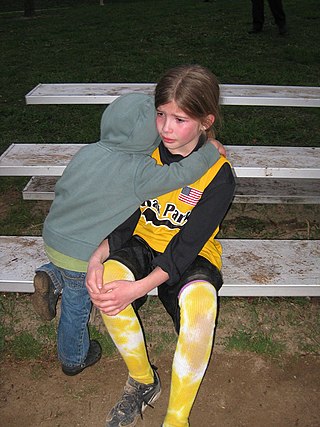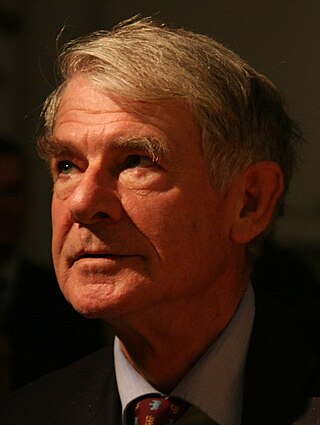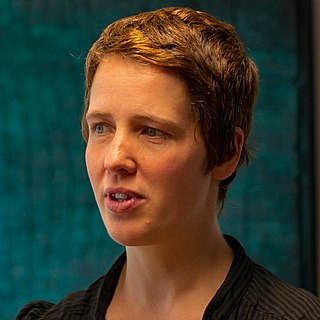
Empathy is the capacity to understand or feel what another person is experiencing from within their frame of reference, that is, the capacity to place oneself in another's position. Definitions of empathy encompass a broad range of social, cognitive, and emotional processes primarily concerned with understanding others. Types of empathy include cognitive empathy, emotional empathy, somatic empathy, and spiritual empathy.

Compassion is a social feeling that motivates people to go out of their way to relieve the physical, mental, or emotional pains of others and themselves. Compassion is sensitivity to the emotional aspects of the suffering of others. When based on notions such as fairness, justice, and interdependence, it may be considered partially rational in nature.
Neuroeconomics is an interdisciplinary field that seeks to explain human decision-making, the ability to process multiple alternatives and to follow through on a plan of action. It studies how economic behavior can shape our understanding of the brain, and how neuroscientific discoveries can guide models of economics.
Neuroplasticity, also known as neural plasticity, or brain plasticity, is the ability of neural networks in the brain to change through growth and reorganization. It is when the brain is rewired to function in some way that differs from how it previously functioned. These changes range from individual neuron pathways making new connections, to systematic adjustments like cortical remapping or neural oscillation. Other forms of neuroplasticity include homologous area adaptation, cross modal reassignment, map expansion, and compensatory masquerade. Examples of neuroplasticity include circuit and network changes that result from learning a new ability, information acquisition, environmental influences, practice, and psychological stress.

Matthieu Ricard is a French writer, photographer, translator and Buddhist monk who resides at Shechen Tennyi Dargyeling Monastery in Nepal.

Richard J. Davidson is a professor of psychology and psychiatry at the University of Wisconsin–Madison as well as founder and chair of the Center for Healthy Minds and the affiliated non-profit Healthy Minds Innovations.

The Max Planck Institute for Brain Research is located in Frankfurt, Germany. It was founded as Kaiser Wilhelm Institute for Brain Research in Berlin 1914, moved to Frankfurt-Niederrad in 1962 and more recently in a new building in Frankfurt-Riedberg. It is one of 83 institutes in the Max Planck Society.

Jean Decety is an American–French neuroscientist specializing in developmental neuroscience, affective neuroscience, and social neuroscience. His research focuses on the psychological and neurobiological mechanisms underpinning social cognition, particularly social decision-making, empathy, moral reasoning, altruism, pro-social behavior, and more generally interpersonal relationships. He is Irving B. Harris Distinguished Service Professor at the University of Chicago.

The Max Planck Institute for Human Cognitive and Brain Sciences is located in Leipzig, Germany. The institute was founded in 2004 by a merger between the former Max Planck Institute of Cognitive Neuroscience in Leipzig and the Max Planck Institute for Psychological Research in Munich. It is one of 86 institutes in the Max Planck Society.
Hyunjune Sebastian Seung is President at Samsung Electronics & Head of Samsung Research and Anthony B. Evnin Professor in the Princeton Neuroscience Institute and Department of Computer Science. Seung has done influential research in both computer science and neuroscience. He has helped pioneer the new field of connectomics, "developing new computational technologies for mapping the connections between neurons," and has been described as the cartographer of the brain.
In psychology, empathic accuracy is a measure of how accurately one person can infer the thoughts and feelings of another person.

The Mind & Life Institute is a US-registered, not-for-profit 501(c)(3) organization founded in 1991 to establish the field of contemplative sciences. Based in Charlottesville, Va., the institute “brings science and contemplative wisdom together to better understand the mind and create positive change in the world." Over three decades, Mind & Life has played a key role in the mindfulness meditation movement by funding research projects and think tanks, and by convening conferences and dialogues with the Dalai Lama. Since 2020, Mind & Life's grant-making, events, and digital programs have sought to nurture personal wellbeing, build more compassionate communities, and strengthen the human-earth connection.
Contemplative neuroscience is an emerging field of research that focuses on the changes within the mind, brain, and body as a result of contemplative practices, such as mindfulness-based meditation, samatha meditation, dream yoga, yoga nidra, tai chi or yoga. The science is interdisciplinary and attempts to clarify such mind-brain-body changes across emotional, behavioral, cognitive, and perceptual domains with an emphasis for relating such changes to neurobiology and first-person experience. It often emphasizes Buddhist approaches to contemplation and meditation, and conflates meditation with various contemplative practices. Founders of the field include Richard Davidson, Francisco Varela and B. Alan Wallace, among others.

Barry Michael Kerzin is an American physician and Buddhist monk. He has lived in Dharamshala, India since 1988 and serves as a personal physician to the 14th Dalai Lama, along with treating people in the local community. Following his ordination as a monk by the Dalai Lama in January 2003, he has travelled, teaching and offering workshops in which he blends Buddhist teaching and his medical training. He has served as a research participant in neuroscience research into the effects of meditation on the brain.
Claus Lamm is a Professor of Biological Psychology and the head of the Social, Cognitive and Affective Neuroscience Unit at the Faculty of Psychology of the University of Vienna. His research focuses on the psychological and biological mechanisms underlying social cognition, affect, and behavior. His main research interest are the neural underpinnings of empathy, to whose understanding he has made pioneering contributions.

Wolf Joachim Singer is a German neurophysiologist.
Philipp Kanske is a German psychologist and neuroscientist. He is professor at Technische Universität Dresden. His research focuses on the neuronal foundations of emotion, emotion regulation and emotion understanding, as well as their changes in mental disorders. Philipp Kanske is speaker of the Junge Akademie.

Viola Priesemann is a German physicist and computational neuroscientist. One of her research priorities is to explore how the human brain organizes its neuronal capacities, to enable meaningful information processing.
Sonja Hofer is a German neuroscientist studying the neural basis of sensory perception and sensory-guided decision-making at the Sainsbury Wellcome Centre for Neural Circuits and Behaviour. Her research focuses on how the brain processes visual information, how neural networks are shaped by experience and learning, and how they integrate visual signals with other information in order to interpret the outside world and guide behaviour. She received her undergraduate degree from the Technical University of Munich, her PhD at the Max Planck Institute of Neurobiology in Martinsried, Germany, and completed a post doctorate at the University College London. After holding an Assistant Professorship at the Biozentrum University of Basel in Switzerland for five years, she now is a group leader and Professor at the Sainsbury Wellcome Centre for Neural Circuits and Behaviour since 2018.
An empathy gap, sometimes referred to as an empathy bias, is a breakdown or reduction in empathy where it might otherwise be expected to occur. Empathy gaps may occur due to a failure in the process of empathizing or as a consequence of stable personality characteristics, and may reflect either a lack of ability or motivation to empathize.










